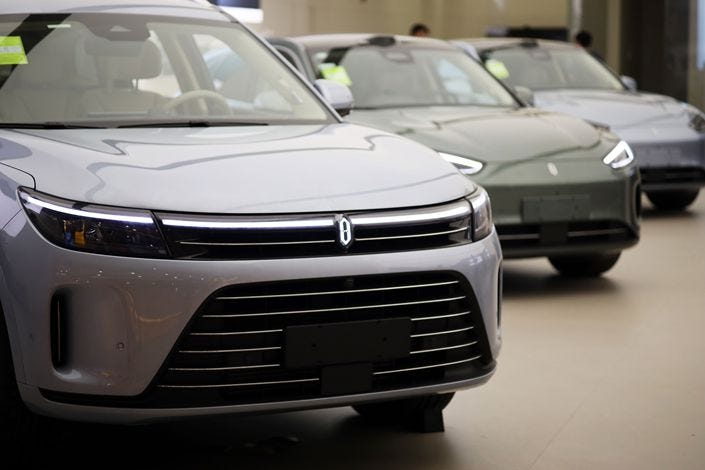Tech Insider: Korean Chip Giants’ China Plants Win U.S. Waivers, Strong Debut for Huawei-Tech Powered EV
Ant Group consumer lending arm plans $625 million capital injection, Alibaba think tank dispels closure rumors
Photo: VCG
Welcome to Caixin’s Tech Insider, your twice-weekly wrap on the movers, shakers and deal-makers in China’s tech scene.
Samsung and SK Hynix China factories win U.S. waivers
The U.S. cleared Samsung Electronics Co. Ltd. and SK Hynix Inc. to supply U.S. chip equipment to their China factories without a separate approval process, South Korea’s presidential office said Monday.
The two South Korean companies received notification that the decision takes effect immediately, South Korea’s presidential economic adviser Choi Sang-mok told reporters Monday at a briefing, according to the Yonhap News Agency.
SK Hynix and Samsung both have major production operations in China, where imports of advanced semiconductor manufacturing equipment and high-performance graphics processing units from the U.S. have been limited under sweeping restrictions rolled out by the Biden administration last October.
China’s BeiDou satellite system comes down to earth
Huawei Technologies Co. Ltd. has billed its new flagship smartphone, the Mate 60 Pro, as the world’s first smartphone with a satellite feature.
Apple’s iPhones can send only text messages to emergency services via satellite when in remote areas without cellular service and can’t make calls. Huawei’s new phone enables satellite-supported two-way text message conversations and can make satellite calls.
The feature is powered by China’s BeiDou Navigation Satellite System, and it marks a milestone in tapping expensive satellite technology for the mass consumer market.
The BeiDou system allows devices to send low-capacity data to its satellites, share their locations and receive messages back from the satellites. That’s a key difference compared to rival satellite systems such as the American Global Positioning System, the Russian Glonass, and the European Galileo, which cannot send messages back to devices.
New Huawei tech-powered electric car launches with a bang
A new electric car powered by Huawei’s autonomous driving technology has hit the market with a bang, attracting tens of thousands of orders in less than a month and giving the telecom-equipment giant a confidence boost as it pushes further into China’s highly competitive auto market.
As of Friday, more than 50,000 orders have been placed for the upgraded version of the Aito M7 SUV since it launched on Sept. 12, said Richard Yu, chairman of Huawei’s smart car unit, in a social media post Saturday.
For each order, customers paid a non-refundable deposit of 5,000 yuan ($695), according to information provided by Aito — a premium electric-vehicle (EV) brand co-developed by Huawei Technologies Co. Ltd. and automaker Seres Group Co. Ltd.
Huawei is pinning high hopes on the Aito line to drive the development of its auto business.
Ant Group consumer lending arm plans $625 million capital injection
Ant Group Co. Ltd.’s consumer lending subsidiary plans to boost its registered capital to 23 billion yuan ($3.2 billion), in a bid to speed up completion of the fintech giant’s years-long, government-driven overhaul.
Seven investors, including Ant Group and Jiangsu Yuyue Medical Equipment & Supply Co. Ltd. (002223.SZ +2.84%), plan to inject 4.5 billion yuan of registered capital into Chongqing Ant Consumer Finance Co. Ltd., recent exchange filings from some of the investors show.
The Chongqing-based firm will use the fresh capital to wrap up its takeover of Ant Group’s lending businesses Huabei and Jiebei, sources with knowledge of the matter told Caixin.
Separating Ant Group’s highly lucrative consumer lending operations from other parts of its business, such as flagship payments platform Alipay, is a key part of the government’s plan to ‘rectify’ the conglomerate’s business and put it on a path to be an ‘upright and innovative enterprise.’
Alibaba think tank dispels closure rumors
The head of Alibaba Group Holding Ltd.-owned Luohan Academy has denied rumors the think tank is closing but said some of its operations will be handed over to its parent as part of a reorganization.
Chen Long told an online group Sunday that the research institute will remain operational, Caixin has learned. But Alibaba will take over responsibilities such as research on environment, society and governance. Operations including research on the digital economy will be handled by a newly established non-governmental organization named “Luohan digital economy research institute,” Chen said.
Chen’s comments came after some media outlets reported that Alibaba planned to close Luohan Academy. The institute was founded in 2018 to “serve society at large, addressing the most important global challenges” such as those related to digital technology.




